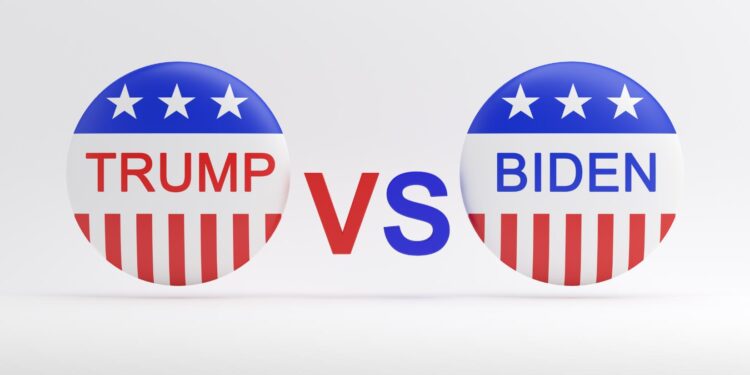As the 2024 presidential election approaches, the political landscape is again abuzz with speculation, analysis, and predictions. Among the many factors that will shape the outcome of this crucial election, African American voters’ perspectives and voting patterns remain a topic of intense interest and importance.

![]()
Historically, African American voters have been a cornerstone of the Democratic Party’s base, consistently supporting Democratic candidates in national elections. This trend has held true in recent presidential races, including the 2020 election, where Joe Biden secured a significant majority of the African American vote. However, as we look ahead to the 2024 election, it’s essential to examine the current attitudes of African American voters towards both President Biden and former President Trump and their broader concerns and priorities.
The Biden Presidency: Promises and Performance
When Joe Biden took office in January 2021, he did so with the strong backing of African American voters. His campaign promises included addressing systemic racism, promoting economic equality, and continuing the fight for civil rights. As his first term nears its end, many African American voters are assessing the Biden administration’s performance on these key issues.
One of the most significant achievements of the Biden presidency has been the appointment of Ketanji Brown Jackson as the first African American woman to serve on the Supreme Court. This historic nomination fulfilled a campaign promise and was widely celebrated within the African American community. Additionally, Biden’s administration has taken steps to address racial equity through executive orders and policy initiatives.
However, some critics argue that progress on major issues such as police reform, voting rights, and economic disparities has been slower than hoped. The failure to pass comprehensive voting rights legislation, in particular, has been a source of frustration for many African American voters and civil rights advocates.
Despite these challenges, Biden maintains strong support among African American voters overall. Many appreciate his efforts to diversify the federal judiciary and his administration’s focus on issues that disproportionately affect communities of color, such as environmental justice and access to healthcare.

The Trump Factor: Lingering Influence and Potential Comeback
Donald Trump’s presidency was marked by deep divisions and controversy, particularly concerning issues of race and social justice. His response to events such as the Charlottesville rally and the Black Lives Matter protests following George Floyd’s death alienated many African American voters. However, Trump and his allies have consistently argued that his economic policies, including low pre-pandemic unemployment rates for African Americans, should appeal to Black voters.
As Trump positions himself for a potential 2024 run, his campaign is likely to emphasize these economic arguments while also attempting to portray the Democratic Party as taking African American voters for granted. Some Republican strategists believe there is an opportunity to make inroads with socially conservative African American voters on issues such as school choice and religious freedom.
However, Trump faces significant challenges in overcoming his low approval ratings among African American voters from his office. Many African American leaders and voters remain deeply skeptical of Trump’s rhetoric and policies, viewing them as harmful to their communities’ interests.

Key Issues Shaping African American Voter Perspectives
As we look toward the 2024 election, several key issues are likely to influence African American voter perspectives and turnout:
- Economic Opportunity: With ongoing concerns about inflation and economic stability, many African American voters are focused on issues of job creation, wage growth, and closing the racial wealth gap. Both Biden and Trump must articulate clear plans for promoting economic opportunity and addressing longstanding disparities.
- Criminal Justice Reform: The movement for police reform and broader criminal justice reform remains a top priority for many African American voters. Candidates’ positions on issues such as sentencing reform, police accountability, and alternatives to incarceration will be closely scrutinized.
- Voting Rights: With ongoing debates about election integrity and voting access, protecting and expanding voting rights remains a critical concern for African American voters. Failing to pass federal voting rights legislation during Biden’s first term may impact enthusiasm among some voters.
- Healthcare: Access to affordable, quality healthcare continues to be a major issue, especially in light of the ongoing impact of the COVID-19 pandemic on communities of color. Candidates’ healthcare plans and their approach to addressing racial disparities in health outcomes will be important factors.
- Education: Education policy is a key concern for many African American voters, from addressing student debt to improving K-12 education in underserved communities. Proposals for expanding access to higher education and vocational training will likely feature prominently in campaign messaging.
- Housing: Affordable housing and policies to promote homeownership are important issues for many African American voters, particularly in urban areas facing gentrification and rising housing costs.

The Role of Young African American Voters
One of the most intriguing aspects of the upcoming election will be the role of young African American voters. This demographic, which played a crucial role in recent elections, including the 2020 presidential race and the 2021 Georgia Senate runoffs, is increasingly assertive in demanding action on issues such as climate change, student debt, and social justice.
Both the Biden and Trump campaigns must develop strategies to engage and motivate young African American voters. This may involve leveraging social media, partnering with influential cultural figures, and addressing issues that resonate particularly strongly with younger voters.
The Importance of Turnout
As in previous elections, turnout will be crucial in determining the impact of African American voters on the 2024 race. Historically, high turnout among African American voters has been a key factor in Democratic victories. Both parties will be investing heavily in get-out-the-vote efforts, focusing on battleground states with significant African American populations.
Factors that could influence turnout include the effectiveness of voter mobilization efforts, the perceived stakes of the election, and voters’ level of enthusiasm for the candidates. The ongoing debate over voting rights and election integrity may also play a role in shaping turnout patterns.

Looking Ahead
As we approach the 2024 election, African American voters’ perspectives will continue to evolve in response to events, policy debates, and campaigns’ efforts to engage this crucial demographic. While historical voting patterns and current polling suggest continued strong support for the Democratic candidate among African American voters, it’s important to recognize the diversity of views within this community.
Both the Biden and Trump campaigns, as well as any other candidates who may enter the race, will need to articulate clear, compelling visions that address the priorities and concerns of African American voters. This will involve making promises and demonstrating a track record of delivering results and a genuine commitment to addressing longstanding issues of racial equity and justice.
Ultimately, the perspectives of African American voters on Biden, Trump, and the 2024 presidential race will be shaped by a complex interplay of factors, including policy proposals, personal appeals, broader political dynamics, and the candidates’ ability to connect with and mobilize this vital constituency. As the campaign unfolds, it will be crucial to listen to and amplify the diverse voices within the African American community, ensuring that their perspectives and priorities are central to the national political discourse.
In conclusion, while historical trends and current indicators suggest continued strong support for the Democratic candidate among African American voters, the 2024 election remains far from predetermined. Both major parties and their candidates must work hard to earn the trust, enthusiasm, and, ultimately, the votes of African American citizens. As we move forward, it will be essential for political leaders, media outlets, and the broader public to engage in thoughtful, respectful dialogue about the issues that matter most to African American voters and recognize the community’s pivotal role in shaping the future of American democracy.










